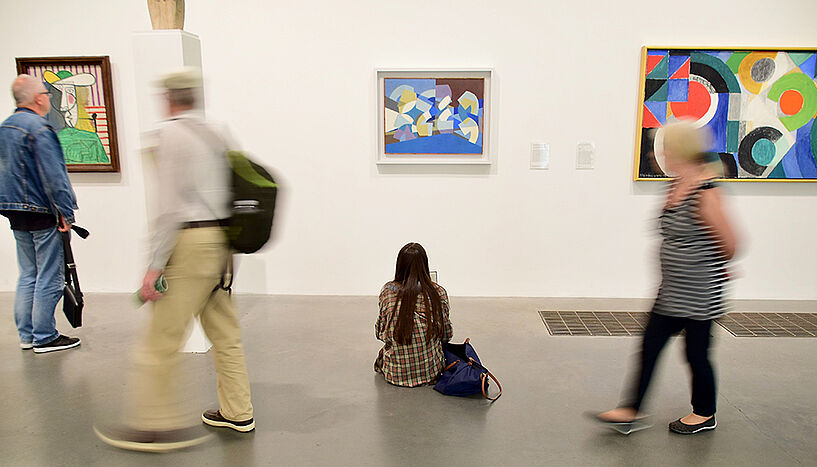How people move in front of an art work can impact their experience
29. March 2023
© iSAW Company (via Unsplash)
The objective measurement of the ways in which people move in front of art shows that there are four different groups that also report different art experiences.
A recent study led by University of Vienna psychologists has shed light on the impact of viewers' movements and positioning when looking at art. By tracking participants' movements, the researchers found that these movements could be clustered into four distinct groups, each associated with different art experiences. The study published in Empirical Studies of the Arts highlights the importance of considering physical engagement and bodily experience in the components of emotional and cognitive experiences of artworks.
When we visit a museum or gallery we naturally move back and forth, side to side and walk around to view the art from different angles. Embodied cognition theory claims that movement is central to our experiences. However, little attention has been paid to the actual ways viewers move in front of art, where they stand, how they approach or shift positions, and in which ways this impacts their personal art experiences.
To address this gap, the group around University of Vienna psychologists Corinna Kühnapfel and Matthew Pelowski for the first time objectively measured how individuals position themselves and move in front of an abstract artwork hung in a mock-gallery space. The team and their collaborators from the Faculty of Psychology, the Department of Art History, the TU Wien, and their international partners tracked the participants' movement via a tracking device developed by the team, as well as simultaneously where participants looked using mobile eye-tracking glasses. The team then analysed the recorded movements with an approach from animal movement ecology to look for shared patterns and also asked participants to self-report on their art experience.
In the study now published in Empirical Studies of the Arts the team finds that the movements could be clustered into four distinct groups and that these groups also report different art experiences. For example, changing the viewing position more while in front of an abstract artwork was related to more insightful experiences while participants who stood farther away had less stimulating experiences.
Thus, the objective assessment of the ways in which people move and position themselves in front of a painting provided a deeper understanding of the complex and multifaceted nature of the art experience. Notably, the psychologists revealed that the ways in which our physical movements while looking at art are important to consider when seeking to understand the components of emotional and cognitive experiences of artworks.
Overall, this study is an exciting proof of concept, providing new directions for unlocking the role of physical engagement and bodily experience in intense and meaningful art experiences. These results may in the future inform curators and artists who seek to create more engaging art experiences by capitalising on the role of the body.
Original publication:
Kühnapfel, C., Fingerhut, J., Brinkmann, H., Ganster, V., Tanaka, T., Specker, E., Mikuni, J., Güldenpfennig, F., Gartus, A., Rosenberg, R., Pelowski, M. How do we move in front of art? How does this relate to art experience? Linking movement, eye tracking, emotion, and evaluations in an ecologically-valid gallery setting. Empirical Studies of the Arts (2023).
Scientific contact
Dr. Matthew Pelowski
Department of Cognition, Emotion, and Methods in PsychologyUniversity of Vienna
1010 - Wien, Wächtergasse
+43-1-4277-47112
matthew.pelowski@univie.ac.at
Corinna Kühnapfel
Department of Cognition, Emotion, and Methods in PsychologyUniversity of Vienna
1010 - Wien, Wächtergasse
+43-1-4277-47111
corinna.kuehnapfel@univie.ac.at
Further inquiry
Mag. Alexandra Frey
Media Relations ManagerUniversität Wien
1010 - Wien, Universitätsring 1
+43-1-4277-17533
+43-664-8175675
alexandra.frey@univie.ac.at
